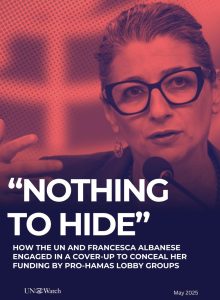“I have never had, and will never have, anything to hide.” So declared Francesca Albanese, United Nations Special Rapporteur on the occupied Palestinian territories, in July 2024, rebuffing allegations by UN Watch that she accepted funding from pro-Hamas lobby groups.
Yet a new exposé reveals a damning contradiction: not only did Albanese, accept such funding, but the United Nations itself is now implicated in a deliberate and sustained cover-up to shield her from scrutiny.
The report, published by UN Watch, accuses Albanese and the UN Human Rights Council of serious ethical violations, financial misconduct, and a concerted effort to obstruct accountability.
Albanese’s initial three-year tenure as Special Rapporteur, from May 2022 to April 2025, has now reportedly been renewed. Her tenure is now cast in the shadow of deception, conflicts of interest, and impunity although she continues to portray herself as a serving UN official—although it appears that her reappointment may be procedurally invalid.
At the heart of the scandal is a trip Albanese took to Australia and New Zealand in November 2023. Marketed as part of her mandate, the trip did not include any investigative work. Instead, it functioned as a lobbying tour, part-funded by unnamed “external” sources—possibly pro-Hamas lobby groups operating in those countries. This is a direct breach of Article 3 of the UN’s own Code of Conduct for Special Procedures, which expressly forbids the acceptance of favours, gifts, or payments from non-governmental actors.
When these allegations first surfaced, Albanese denied everything. So did the UN. She claimed the trip had been entirely funded by the United Nations, a statement repeated by the Secretary-General’s spokesperson. But financial records and administrative responsibilities clearly show otherwise. The Human Rights Office of the UN Secretariat oversees such expenditures, making the denials not only disingenuous but factually indefensible.

“UN Watch’s evidence of Albanese’s financial wrongdoing including taking funding from pro-Hamas lobby groups—key factual elements of which are now confirmed by a UN investigation conducted by Albanese’s close colleagues—establishes that Albanese engaged in grave violations of the Code of Conduct.
“Yet instead of upholding its rules and enforcing accountability, the UN chose to grant her impunity,” –UN Watch Report, p.3
Rather than subject Albanese’s actions to impartial review, the UN Secretariat opted for an internal mechanism: the Coordination Committee of Special Procedures.
But far from being neutral, this body is riddled with conflicts of interest—its members are professional allies and defenders of Albanese. Predictably, they failed to act on the initial complaints filed in November 2023. For 16 months, silence reigned.
That silence was shattered in March 2025 when a chorus of governments—among them the United States, Israel, Argentina, Hungary, and the Netherlands—joined UN Watch and lawmakers worldwide to protest Albanese’s reappointment. Abruptly, the same Coordination Committee that had done nothing for over a year rushed out a letter largely absolving her of wrongdoing.
The timing was far from coincidental. The President of the Human Rights Council, under pressure to justify Albanese’s renewal, appears to have used the committee’s whitewash as a fig leaf to circumvent required deliberation under Presidential Statement 8/PRST/2.
Yet even the committee’s own findings were damning. The letter acknowledged several violations of UN rules: antisemitic posts on social media, unauthorised use of external assistants, undisclosed third-party funding, and improper payments to a research assistant. Any one of these breaches would normally be grounds for dismissal. Instead, the report’s authors performed semantic gymnastics to wave her through to a second term.
The message is clear: there is one standard for ordinary UN officials, and another for those whose politics align with the Human Rights Council’s entrenched ideological biases.
This isn’t just about one official’s misconduct—it’s a case study in institutional rot. The UN’s handling of Albanese’s violations illustrates a deep and troubling culture of impunity. Despite a well-documented pattern of non-compliance with the Code of Conduct, the organisation not only failed to act—it actively facilitated the cover-up. It allowed a compromised official to be renewed in defiance of its own procedures, dismissing legitimate concerns from multiple member states.
In doing so, the UN undermines its credibility. It diminishes the moral authority of its human rights mechanisms and makes a mockery of the very principles it claims to uphold. For an organisation that so often preaches transparency, accountability, and integrity, the hypocrisy is staggering.
Francesca Albanese may claim she has “nothing to hide,” but the facts suggest otherwise. Her record is riddled with breaches of ethics and financial impropriety. More disturbing still is the UN’s role in shielding her from consequence, betraying the trust of member states and the public alike.
UN Watch is now calling for an independent investigation—not just into Albanese’s conduct, but into the entire machinery of the UN system that enabled her. That call should be heeded. The world cannot afford to let an institution so central to international peace and justice continue to police itself in the shadows.
If the UN wishes to be taken seriously as a guardian of human rights, it must begin by holding its own house to account. Otherwise, it risks becoming not a beacon of justice, but a sanctuary for the untouchable.
Read the full UN Watch report on Francesca Albanese here.
Main Image: Palestinian Centre for Human Rights.

